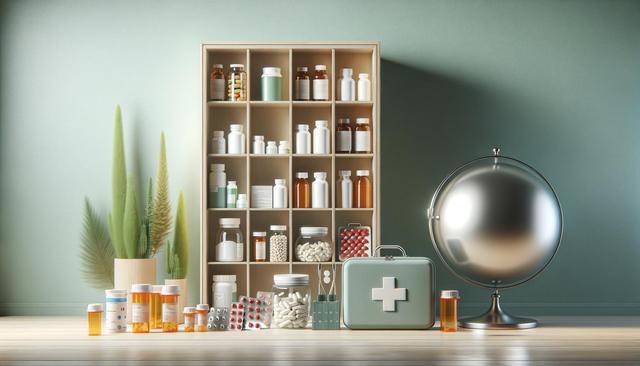Smart Medicine Cabinets: A Modern Health Hub
Traditional medicine cabinets are evolving into intelligent health stations. These advanced units are no longer limited to passive storage. Instead, they are being equipped with smart features that integrate with mobile apps, home assistants, and health monitoring systems. The goal is to ensure medications are not only stored properly but also managed efficiently to support daily routines and chronic care. These cabinets can alert users when a medication is running low or when it has expired, helping to reduce medication errors and improve compliance.
Some smart cabinets now include temperature and humidity sensors to maintain optimal storage conditions, which is particularly important for medications that are sensitive to environmental changes. Users can also lock these cabinets remotely, adding a layer of safety for households with children or vulnerable individuals. Key features often found in these modern cabinets include:
- Automated inventory tracking
- Real-time alerts and reminders
- Secure, app-controlled access
- Voice assistant compatibility
As these innovations become more mainstream, they offer a practical solution for individuals managing multiple prescriptions or caregiving responsibilities.
Smart Pill Organizers: Reinventing Daily Dosing
Smart pill organizers are rapidly gaining attention for their role in transforming medication adherence. These devices go beyond simple compartmentalization by incorporating digital reminders, tracking usage patterns, and syncing with smartphones. When paired with a mobile app, users receive timely alerts to take their medications and can track their adherence over time. This is especially beneficial for individuals with complex dosing schedules or memory-related challenges.
Some smart organizers even feature locking mechanisms that only open the correct compartment at the designated time, minimizing the risk of double dosing or skipped medication. Additional features include:
- Audio and visual reminders
- Bluetooth or Wi-Fi connectivity
- Daily, weekly, or monthly scheduling options
- Caregiver notifications in case of missed doses
These devices serve as a valuable tool for both users and healthcare providers, offering better control over chronic conditions and reducing the likelihood of hospitalizations due to medication errors.
Temperature Control and Medication Stability
Proper storage temperature is vital for maintaining the integrity of many medications. Innovations in portable and home-based refrigeration units are addressing this need, ensuring that medications such as insulin, certain antibiotics, or biologics remain effective. These storage solutions often come with digital interfaces that display real-time temperature data and alert users when temperatures fall outside the recommended range.
For travelers or individuals living in regions with extreme climates, temperature-controlled cases and containers provide a reliable solution. Some of these products are powered by rechargeable batteries or solar panels, offering flexibility and independence. Key elements of modern temperature-controlled storage include:
- Real-time temperature monitoring
- Portable, battery-powered options
- Alerts for temperature fluctuations
- Compact and travel-friendly designs
These solutions help users maintain adherence to therapy even under challenging conditions, making them especially useful for people managing chronic conditions on the go.
Medication Management Apps and Integration
Medication storage is increasingly linked to digital health ecosystems through management apps. These applications sync with smart storage devices and offer a centralized platform for tracking prescriptions, refills, and adherence. Users can set reminders, monitor their intake, and even share their data with healthcare providers or caregivers. This integration enables more personalized and proactive healthcare management.
Some apps offer advanced analytics, giving users insights into their usage patterns and suggesting improvements. Integration with wearable devices and telemedicine platforms also supports real-time monitoring and intervention when necessary. Common features include:
- Customizable medication schedules
- Push notifications and refill alerts
- Secure data sharing with healthcare professionals
- Integration with smart home systems
By fostering communication between patients and providers, these apps enhance accountability and ensure that medication routines are followed more consistently.
Safety and Accessibility in Storage Design
In addition to technological upgrades, there is a growing emphasis on designing medication storage that is both safe and accessible. Accessibility is particularly important for older adults or individuals with limited dexterity. Easy-open containers, clear labeling, and user-friendly interfaces are becoming standard features in new product designs. Many storage units now include tactile indicators and voice prompts to assist users with visual impairments.
Safety-focused innovations are also addressing the risk of accidental ingestion, especially in households with children. Features such as child-resistant locks and tamper-evident seals are being enhanced with smart notifications if a container is accessed unexpectedly. Considerations for improved safety and accessibility include:
- Ergonomic design for ease of use
- Visual and auditory cues
- Childproof and tamper-resistant features
- Clear and multilingual labeling
These thoughtful design elements not only improve day-to-day convenience but also support a safer home environment for all residents.
Conclusion: Preparing for the Future of Medication Storage
As we look ahead to 2025 and beyond, the future of medication storage is being shaped by a blend of smart technology, user-centered design, and digital integration. These innovations aim to simplify complex medication routines while enhancing safety, convenience, and adherence. Whether through smart cabinets, pill organizers, or connected apps, individuals now have more tools than ever to take control of their health. For caregivers, healthcare providers, and patients alike, these advancements represent a meaningful step forward in everyday wellness management.






